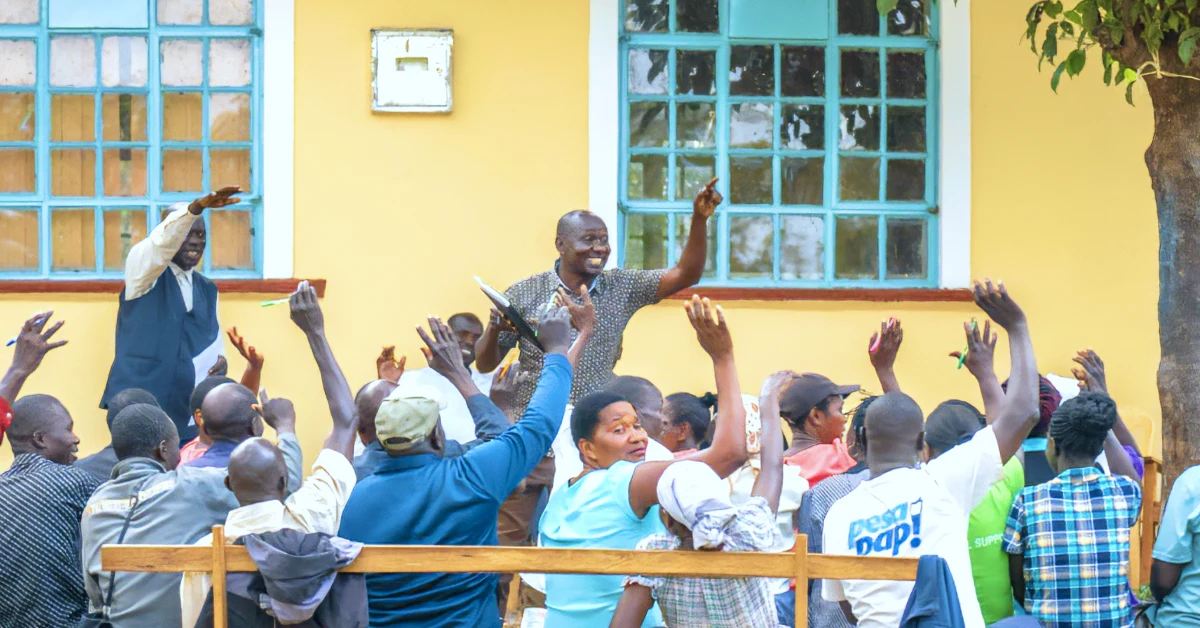Lessons On Community, Doing the Hard Thing, and Creating Meaningful Impact

Earlier this year, during Transcarent’s inaugural client conference, Voyages, we sat beneath the desert stars as a community of changemakers in health and care. Over dinner, we connected with one another, borrowing ideas, building relationships, and talking through the challenges facing our healthcare system today.
The sound of clinking forks and chatter silenced as Drs. Milton and Fred Ochieng’ took the mic to share their own inspiring story of community, doing the hard thing, and driving meaningful change.
It Starts With Community
These two brothers hail from a small village called Lwala located in Kenya. Their story started with community. They talked about their neighbors — how no child belonged to just their own parents, but how all parents watched out for one another’s children. They talked about sharing meals and resources to support other families. And most notably, how the community came together, selling their chickens, goats, and cows, to pay for their plane tickets to the United States as they received scholarships to Dartmouth for their academic achievements.
“Don’t forget us.”
That was the only request made of their neighbors, and Drs. Milton and Fred certainly did not forget. They set out to get their degrees and later go to medical school at Vanderbilt University in hopes of fulfilling their father’s dream of opening a clinic in Lwala — the first of its kind in their region.
Following the tragic passing of both of their parents due to AIDS while they were completing their studies, they went back to their village in Kenya and opened Lwala Community Hospital, never forgetting where they came from and supporting those who supported them.
Changing the Status Quo
Nearly everywhere in the world — from rural Kenya to major cities in the United States — people are struggling to access high-quality, affordable health and care. The systems we’ve built are often fragmented, inequitable, and slow to evolve. The need for transformation has never been more urgent.
As drivers of change in health and care, we know that improving outcomes and access won’t come from doing what’s easy or familiar. True progress demands that we challenge the status quo and reimagine the system from the ground up — centered on people, relationships, and trust.
That’s exactly what Drs. Milton and Fred Ochieng’ did. Faced with the heartbreaking loss of their parents to AIDS, like 1.3M other orphaned children across Kenya— they chose to act. They didn’t wait for perfect conditions or a fully built plan. Instead, they rallied support from universities, faith communities, public service officials, and neighbors to return home and build a model of care that was deeply rooted in the needs of their community.
Their story reminds us: meaningful change is hard — but necessary. And when we act with urgency, authenticity, passion, and vision, we can reshape what healthcare looks like — not just in one village, but everywhere.
Driving Impact
Building this clinic in Lwlala was not just a dream of a compassionate community member, but it represented the dire need for healthcare in the area, especially as it pertained to HIV and high maternal mortality. Drs. Milton and Fred led with a vision of eradicating these common issues that were plaguing their community.
Their non-profit organization, Lwala, was founded through grassroots efforts, and their vision of developing community-led solutions that transform health systems has not wavered. Over the past 18 years, the organization has grown to drive meaningful impact, stronger research, and a healthier population — not only in the six counties and for 2.8M people they currently serve in Kenya, but also by leading a global movement for professionalized community health.
Lessons For All Health and Care Changemakers
Drs. Milton and Fred Ochieng’ were working against some of the most challenging odds in a deeply underfunded area of the world. Yet, through the strength of community, the willingness to do the hard and important work, and a clear vision for change, they built something extraordinary.
Their story isn’t just inspiring — it is a call to action.
Here in the United States, our health and care challenges may look different, but they are no less urgent. Too many people struggle to access care that is affordable, high-quality, and centered around their needs. The lesson from Lwala is clear: change is possible when we lead with purpose, listen to communities, and commit to bold, people-first innovation.
Let’s ask ourselves: What are the bold moves we need to make now? How can we build systems that truly reflect the communities we serve? And are we ready to lead the way to a new status quo and a future where health and care finally work as they should — for everyone?
To learn more about Lwala, visit https://lwala.org/
